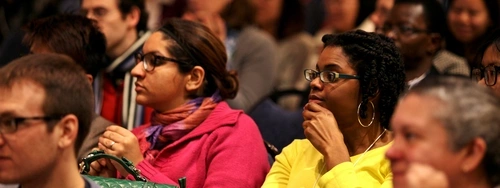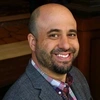2026 Conference
For more information about the 2026 Conference details, please visit the website.

Convened by the Center for Urban Ethnography at Penn GSE since 1980, the Ethnography in Education Research Forum is internationally recognized for its encouragement of original and in-depth ethnographic research on education broadly defined, within and outside the context of schooling. The Forum provides a space for ethnographers in a range of disciplines and fields to come together across generations to share and learn from each other and, in so doing, to become part of a broader intellectual community. The Forum is committed to advancing systematic, rigorous, and engaged inquiry and to involving students in all phases of the meeting.
We would like to extend our heartfelt appreciation to the outgoing leadership team for their dedication and exemplary service in organizing our conference. They have been apt stewards of the conference, its legacy, and its mission to foster meaningful connections among participants. As we embark on a new chapter, we are excited to announce a seamless transition of leadership, ensuring continuity and fresh perspectives. Our focus now shifts toward charting an ambitious path forward, with plans to expand the conference’s scope and impact, promising an enriching experience for all attendees. We remain as dedicated as ever to sustaining the legacy of the Forum as the lead conference in the field of ethnography and education as well as an intellectual space that nurtures younger scholars and students. We look forward to sharing further updates on the Forum soon.
Forum Fast Facts
-
February 6–7, 2026 Next Conference Dates
-
Theme #Facts: Constructing Knowledge and Truth in a Complex World
-
April 15–June 1, 2025 Submissions open through this period
-
Location University of Pennsylvania, Graduate School of Education, Philadelphia PA
-
November 14, 2025–January 16, 2026 Registration
-
TBA Plenary and Keynote Speakers
Call for Papers 2026
#Facts: Constructing Knowledge and Truth in a Complex World
In an era marked by rapid changes in information technology, shifting political ideologies, and growing debates over the nature of truth, next year’s conference seeks to unpack how “facts” and “knowledge” are produced, understood, and contested across different settings. For our February 2026 conference, the Ethnography in Education Research Forum therefore invites submissions that explore the complex intersections of knowledge, truth, and everyday life through the lens of ethnography and practitioner inquiry.
Although we welcome all papers dedicated to ethnographic and practitioner inquiry, we are particularly interested in encouraging submissions that critically examine foundational epistemological and ontological questions about ethnographic practice: How do we define knowledge in ethnographic work? What assumptions do we carry about the truth our research aims to reveal? We also welcome submissions that reflect on the broader processes of knowledge production both within the academy, and also within community institutions and public spaces. How do “facts” take shape in the public sphere, and what do these processes tell us about the values embedded within society and our institutions?
Additionally, we seek papers that investigate how facts are constructed and challenged in today’s global media-scape, where social media, journalism, and online political platforms increasingly influence what the public understands as “true.” How are facts framed, distributed, or distorted in the current information economy, and what role does education play in either reinforcing or challenging these narratives?
We further encourage contributions that push the boundaries of conventional ethnography, practitioner inquiry and qualitative methodologies, as well as those that explore innovative frameworks for understanding the production of knowledge in precarious times.
We look forward to your contributions to this critical and timely dialogue. We will be accepting papers from April 15 to June 1, 2025 for the conference which will run in Philadelphia, Pennsylvania on February 6-7, 2026.
Submission Information
Submissions open April 15 through June 1, 2025.
Forum Leadership and Staff
Graduate Assistants
- Yuetong Jiang (2024-2025), Master's Student in Education, Culture, and Society
- Sherry Lin (2024-2025), Master's Student in Higher Education
- With special support from Felicity Breedlove and Hidy Li
- Lucia Mao (2023-2024), Master's Student in Education, Culture, and Society
- Zora Viel (2023-2024), Master's Student in Education, Culture, and Society
Our History
The Center for Urban Ethnography (CUE) was founded in 1969 with a major grant from the Center for Studies of Metropolitan Problems of the National Institute of Mental Health. CUE moved to the Graduate School of Education in 1976, where it undertook a series of funded research projects, including studies of urban literacy, urban neighborhoods, and a range of other urban issues. The expertise of the staff and faculty associates of the Center for Urban Ethnography is nationally recognized in the areas of practitioner research, ethnographic research design, school/community studies, qualitative evaluation and technical assistance, and monitoring classroom instruction and learning environments.
CUE first convened the annual Ethnography in Education Research Forum at the University of Pennsylvania Graduate School of Education in 1980. The Forum has from the beginning excelled in nurturing ethnographic research and researchers in schools. The Forum is known for its friendly and supportive atmosphere for fledgling researchers and for the spirit of relaxed and open dialogue embracing newcomers and oldtimers alike.
Practitioner Inquiry Day at the Ethnography Forum was initiated in 1987 by Marilyn Cochran-Smith and Susan L. Lytle – both assistant professors at Penn GSE at the time – and grew from the burgeoning interest in teacher research, action research, critical action research, and participatory research that was evident across the U.S. and internationally. From the beginning, the intent of Practitioner Inquiry Day was to provide a space for educators to share their research in various formats, including papers, symposia, data sessions, and informal group discussions. A number of featured speakers, groups, and individuals from around the U.S. and internationally have attended and presented during Practitioner Inquiry Day. Participants are K-12 teachers, community college and university teachers, public and independent school leaders, community organizers, social activists, and others who share a commitment to democratizing the discourse around teaching, learning, and leading to include the voices and ideas of a wider span of participants.
Practitioner Inquiry Day celebrated its 10th anniversary in 1997, its 20th in 2007, and its 25th in 2012, each time with a special program to acknowledge and explore the evolving movement of practitioner research. At its 20th anniversary, there was a memorable Reader’s Theater performance, “Practitioners’ Voices,” that highlighted the rich perspectives and diverse experiences of teachers, school leaders, and other educators whose inquiries explore teaching, learning, and schooling (Cochran-Smith & Lytle, 2009). In 2012, on the 25th anniversary of Practitioner Inquiry Day, Professor Gerald Campano initiated a midday Forum for presentations that focus on Communities of Inquiry. Special celebrations and events have marked milestones in Teachers College Press’ Practitioner Inquiry Series, which grew out of the Ethnography Forum’s Practitioner Inquiry Day, and each year there has also been a special display of books by and for practitioner researchers.
After more than three decades, Practitioner Inquiry Day remains faithful to its roots by providing a dedicated space for educators, practitioners, and community organizers to come together and inquire into, theorize, and collectively make meaning of their sites of practice.


